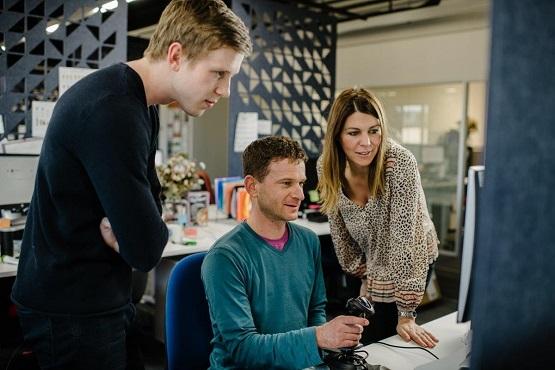
Credit: (C) Turning Point
A recent study has shown that it may be possible to dampen the workings of the subconscious brain to prevent alcohol relapse, the results leading to a world-first trial of a personalised smartphone app called “SWiPE”.
Cognitive Bias Modification, a new form of computerised brain-training, is focused on training the brain to automatically avoid alcohol cues, with findings showing that early relapse was reduced by 17 percent after four sessions of CBM, compared to those who received a “control” (placebo) version of the task.
Regular drinkers have a ‘cognitive bias’ to alcohol cues such as places, sights, smells, and social situations that remind them of drinking, subconsciously capturing attention, driving impulses to seek out and drink alcohol. When these cues become less attention-grabbing and less rewarding, our subconscious brain has less influence on our behaviour, leaving more room for our conscious brain to drive decision-making.
Published in JAMA Psychiatry and led by researchers from Turning Point, Monash University and Deakin University, the study has resulted in researchers developing a CBM smartphone app called “SWiPE” where people can upload alcoholic beverages or brands they wish to train their subconscious brain to avoid, while at the same time ‘approaching’ images of more positive, healthy activities they want to do more of.
Associate Professor Victoria Manning, Head of Research and Workforce Development, Turning Point and Associate Professor in Addiction Studies, Monash University says “preventing relapse in the period following alcohol detox is really important because that is when people engage in psychological treatments and peer support groups that have shown to help people recover from alcohol problems.”
“A lot of the time, people wanting to quit or take a break from alcohol experience a form of internal conflict – they know it’s important not to drink, but at the same time, they really want to have a drink”.
Our conscious brain allows us to think about the things we’ll gain by not drinking – saving money, better sleep, better health, better relationships – and it enables us to focus on some of the positive, healthier things we can do instead. The problem is that there is also the subconscious brain at work saying “go on… have one, it will relax you, make you feel better, you deserve it”, even if those benefits are not entirely- true or just short-lived. Unfortunately, all too often, the subconscious brain wins the battle.
The researchers are really encouraged by these results: “Being easy-to-implement, safe and requiring only a laptop and joystick, we’d love to see CBM routinely offered as an adjunctive intervention during inpatient withdrawal, to optimise patient outcomes” says Associate Professor Victoria Manning.
“We know only a small percentage of people with alcohol problems seek treatment. Therefore, having low-cost, widely-available, evidence-based interventions available outside of traditional treatment settings will mean more people have access to anonymous and convenient, easy to use support tools when they most need them.”
The team is currently examining SWiPE’s feasibility, acceptability and effectiveness at reducing alcohol consumption and cravings and preliminary findings suggests app-delivered CBM is also looking very promising.
###
This research was funded by the National Health and Medical Research Council (NMHRC).
For more info visit or to participate in the study visit http://www.
Read the full paper in JAMA Psychiatry titled: Effect of Cognitive bias modification on early relapse among adults undergoing inpatient alcohol withdrawal treatment a randomized clinical trial.
DOI: 10.1001/jamapsychiatry.2020.3446
For Media Enquiries please contact:
Wendy Smith – Media, Monash University
E: [email protected]
T: +61 (0) 425 725 836
For more Monash media stories, visit our news and events site
Media Contact
Wendy Smith
[email protected]
Related Journal Article
http://dx.




